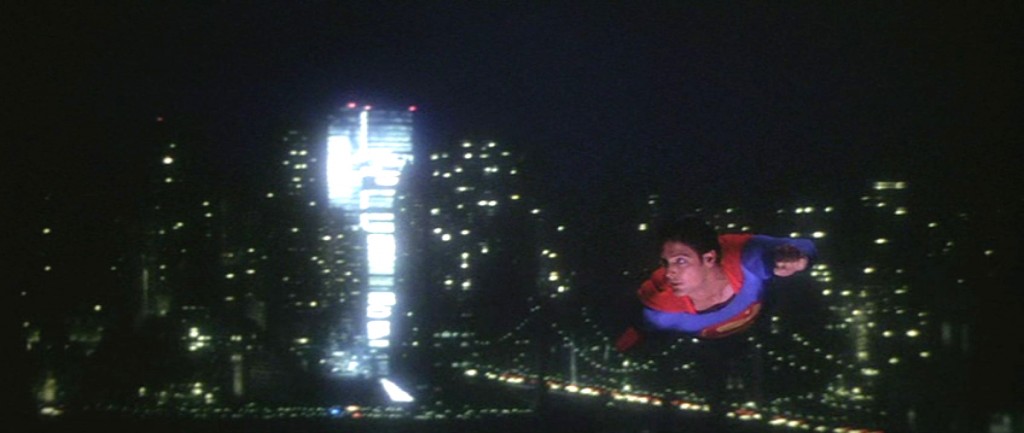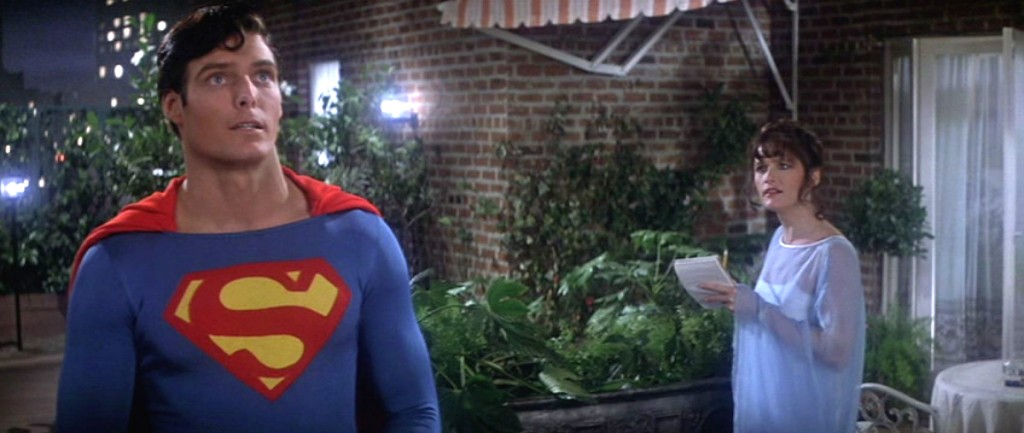Superman: Superman: The Movie part 4
What does Superman want? It seems like an odd question to ask at this point, but the movie Superman spends its first seventy minutes setting up a conflict between impulses for its title character, and now that he’s emerged, it’s a question worth asking. Once Superman shows up to save Lois Lane, the genie is out of the bottle, so to speak, and the movie, once again, does something odd – it stops for a few minutes for Superman to buzz around town doing Superman stuff. It’s a no-brainer for him to save Lois from a plummeting helicopter (he’s in love with her after all), but then we see him 1) stop a jewel-thief in the midst of a building-climb, 2) foil a robbery getaway, 3) rescue a cat from a tree, and 4) save Air Force One when it is struck by lightning in mid-flight. Saving people (and a cat) is an easy choice, but why does Superman necessarily foil criminals? And, once he’s made the decision to foil criminals, why does he foil only these criminals? Was there really no other crime happening in Metropolis that night? Was the city otherwise a peaceful idyll for the time he spent saving the cat? For that matter, to save Lois Lane is one thing, he’s in love with her (although the narrative has shown no good reason why), but when he makes the decision to save the president over other people (or a cat), he’s making a specific choice. Superman decides who is worth catching and who is worth letting go, and he decides who is worth saving and who is not.
How does this sequence funcion narratively? I’ll tell you, as teenager watching the movie in 1978 (he said, contemplatively stroking his long white beard) the feeling was “Finally, the movie is starting.” This sequence, beginning over an hour into the narrative, is like a title sequence for the rest of the movie. No plot emerges from Superman’s randomly-selected salvations and punishments, but tonally the sequence is a miracle, literally. It presents a world-changing night when suddenly there is a god on earth, nabbing the bad and protecting the endangered. As the first-ever sequence presented in a wide-screen, big-budget superhero movie, it’s a complete game-changer. It’s what we came to see, and the notion that there would be a god out there deciding who was worth imprisoning and who was worth rescuing was a brand-new, very powerful thing in the movies. Not even a Biblical epic could give an audience a secret god, Moses and Jesus and Noah (I can’t think of any others who got their own movies) could never disguise themselves to mete out punishments and rewards. In 1978, America very much needed a way to feel good about itself and Superman suggested that somewhere there was a man, a man with heavenly origins but Midwestern upbringing, who knew what made America great and could show us the way with politeness and good humor. And let it be said that Christopher Reeve rose to the challenge magnificently and became the image of Superman to my generation. When the authors of Kingdom Come dedicated their book “to Christopher Reeve, who made us believe a man could fly,” they spoke for everyone who saw Superman in the theater.
Lex Luthor sees the emergence of Superman as a challenge to himself. Which makes no sense, but it helps draw Luthor as a raging egotist, that he would interpret anything in the news as being about himself. Perry White sees a commercial opportunity in exploiting Superman for the sake of selling papers (someone please let me know if the Perry White in the comics was this cynical). He goes so far as to say that whoever gets the Superman story will have “the single most important interview since God talked to Moses,” tipping the script’s metaphorical hand. Superman himself, on the other hand, seems to want only one thing from his new-found fame: to make time with Lois.
Superman goes to see Lois at her apartment (she has a terrace, apparently she inherited the lease from a relative, no reporter in her 20s could afford such a place) and proceeds to play coy with her, alternately laying on the charm and playing the boy scout. She, in turn, alternately teases and plays coy. It’s a classic piece of romantic playoff, made odd here only because the title character just showed up. We know that Clark likes Lois, but is Superman the story of a small-town boy who falls in love with a big-city reporter and uses his alter-ego, Cyrano-like, to woo the lady in question? Or what? What is Superman about? Twenty minutes earlier it was about two fathers battling across galaxies over the fate of their son, now it’s a love story about a guy who saves the president (and a cat) and uses his good deeds to impress a young lady whose dress he can see through.
What does Lois Lane really represent to Kal-El/Clark Kent? What does she mean to him? She’s a cynical career-gal who rarely meets Clark’s eye, but is head-over-heels gaga for Superman. There is an obvious fanboy-pandering angle: “If she only knew how awesome I am secretly she’d go to bed with me.” But is that who Kal-El/Clark Kent is? Let’s string it together again. Jor-El wants Kal-El to be a god among mortals (and not change their history – thanks dad), Jonathan Kent wants Clark to hide in the shadows and not call attention to himself. Lois Lane, it could be argued, is like Harvey Dent in The Dark Knight: she’s “daytime Superman,” afflicting the comfortable and comforting the afflicted in her capacity as a journalist. But we never see her as a crusading journalist, we see her only as a cynical manipulator, an exploiter of base human instincts.
But another way to look at the Lois-Clark dynamic is that Lois is who America is and Clark/Superman is who it wants to be. Because the underhanded joy of watching the Lois/Superman scenes is watching the ways that Superman coyly manipulates the manipulator, dominates the dominator, turns the streetwise career-gal into stammering mush. In his own devious way, Superman is trying to show Lois that there’s something better to write about than rape and murder. “I’m here to fight for truth, justice and the American Way,” he tells Lois with a straight face, as though the American Way hadn’t led the nation into Vietnam and the Watergate scandal. But “to dominate” is not a romantic impulse, and neither is “to show the way.” Why is Clark Kent in love with Lois? Is he? Or is he just trying to prove a point? Can a god really fall in love with a mortal? Could we imagine a scene where Moses seduces Nefretiri by telling her the color of her underwear? And, how much crime runs rampant in Metropolis while Superman romances Lois? How many cats perish in trees?


Have you read ASTRO CITY, specifically the story “In Dreams” which features the Superman analog Samaritan?
Nope! I’ve heard it’s wonderful though.
Todd, what do you think of the “Can you read my mind?” sequence? With Lois’s rhyming internal monologue, it’s almost like a musical number in the middle of a superhero movie.
Getting back to the question of Superman’s identity, I’d say that he is indeed Clark Kent from the American heartland, but he’s not “Clark Kent,” in terms of being the clumsy bumbler cover persona. It’s like, in the Nolan Batman movies, you have the real Bruce Wayne who interacts with Alfred and Lucius Fox, and the phony, drunken playboy “Bruce Wayne” he pretends to be in public. When Christopher Reeve plays “Clark Kent,” he’s like being a nebbisch from a screwball comedy, just as Lois Lane is like Hildy Johnson from ‘His Girl Friday.’
In fact, the Lois/Clark rom-com dynamic from ‘Superman’ is rather similar to the Jennifer Jason Leigh/Tim Robbins rom-com dynamic from ‘The Hudsucker Proxy.’ But I think you pointed out its origins in ‘Mr. Deeds Goes To Town.’
I find the “Can You Read My Mind?” sequence to be dated but harmless. The movie needs a “moment” to land the love story and that’s the choice the filmmakers made. It’s not an elegant solution but it’s a clear, definite choice and an innovative one.
The “streetwise girl reporter” I date to Mr. Deeds, which is 1936 and seems like a clear influence on Lois Lane. His Girl Friday is 1940 and Lois had already been established. Jennifer Jason-Leigh in Hudsucker is one of my favorite film performances, but is much closer to Rosilind Russell than Jean Harlow and closer to Katherine Hepburn than either.
1. The fact that people all over the world are dying every day while Clark hangs out with Lois and Jimmy is perhaps the most problematic aspect of the Superman character in any format. This film does not acknowledge this Muddy Trousers problem, but I would say that the point of the post-helicopter montage is that Superman is not a utilitarian. That he just wants to do good in any way that he can, and that saving a cat is just as valid a use of his time as saving a President.
2. I’m really not sure where you are getting that Jonathan wants Clark to hide in the shadows. Jonathan doesn’t want Clark to use his powers to show off, but that’s not exactly the same thing. He tells Clark that he is destined for something greater and he doesn’t want Clark to stifle that greatness. He just wants Clark to retain his humility.
3. As for Lois, I think it is pretty clear that in this movie Clark/Superman loves Lois because Lois is us. She is Humanity with all of the the best and worst parts at the fore.
4. I would say that Superman the Movie is about asking if Superman, the best man on Earth, is the best of us because of his humanity or because of his divinity. I think as flawed a film as this movie can be, and boy howdy, there are are some rough spots, the thematic elements are rock solid. And right along with Reeve’s performance and Williams’ score, that thematic throughline is why this film is still great.